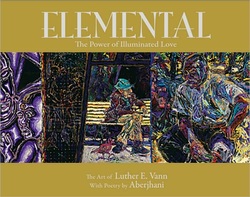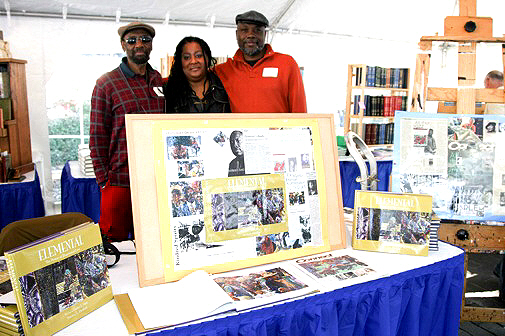The Amazing Gift of ELEMENTAL, The Power of Illuminated Love

ELEMENTAL, the Power of Illuminated Love is an exuberant book that is almost “over the top” in the way it combines explosions of creativity with quiet expressions of spirituality. The pages showcase full-color reproductions of paintings by a modern master paired with the writings of a celebrated author and make up the kind of book that has been long treasured among those with a strong appreciation for exceptional art and inspiring literature.
The paintings and sculpture are those of Luther E. Vann, whose works are part of the Telfair Museum of Art’s permanent collection. The poetry and the bulk of essays are by the award-winning author known as Aberjhani, frequently acclaimed for his works in different literary categories, including fiction, history, and journalism. In total, more than 60 brilliant works fill the book in several sections that begin with revealing interpretations of the art and continue with ekphrastic poems that do not necessarily describe the paintings but seem to flow from their essence. They confront such issues as modern warfare, overcoming personal tragedy, living love at heights approaching inner ecstasy, and remaining true to one’s sense of personal destiny.
ELEMENTAL is based largely on Vann’s visual art and the book explores it as a means to strive for and sustain the highest levels of creative industry. Because the challenge is such a daunting one, the pictures are not always “pretty” in the traditional sense of the term. The poetry and prose reflect the need to claim both the “ugliness” in a life as well as its “beauty” in order to produce creative works of meaningful significance. Perhaps the highest praise anyone can make for this book that citizens of Savannah, Georgia, felt so strongly about that they pushed for its publication and made it happen is that it is true to the soul of its creators and therefore an authentic gift to the collective soul of the world.
Achieving Elemental Success by Embracing the Unexpected
One very useful interpretation of the phrase “think outside the box” is this: remain open to good professional advice from unexpected sources. Appropriately enough, I did not gain that bit of insight while reading the latest text on business strategies offered by Pepsi CEO Indra Nooyi or master investment guru Warren Buffett (though I would certainly give any private communiqué from either of them my undivided attention.)
That particular light bulb of realization came on while I was reading The Angel’s Game, a novel (or all things) by Carlos Ruiz Zafón. In the author’s beguiling n which one of the characters states the following in regard to a publishing proposal:
That particular light bulb of realization came on while I was reading The Angel’s Game, a novel (or all things) by Carlos Ruiz Zafón. In the author’s beguiling n which one of the characters states the following in regard to a publishing proposal:
“All business opportunities stem from someone else’s inability to resolve a simple and inevitable problem.” (Carlos Ruiz Zafon)
Reading those words, I could not say “WOW!” loud enough, not only because they chimed so beautifully with truth but because they armed me with a new perspective on a problem I’d been wrestling with in regard to one of my books: ELEMENTAL The Power of Illuminated Love. I am tremendously grateful for the opportunity to have published award-winning works of historical writings, fiction, and journalism, but ELEMENTAL occupies a very place among these works because it started out in 1991 as a literary underdog and then finally emerged on May 29, 2008, as a people’s choice champion. It was made available after almost two decades when supporters of the arts in Savannah, Georgia, via the Telfair Museum of Art and the Friends of African-American art, raised funds to publish the now celebrated gift book.
The Challenge and the Solution
The problem stemmed from the fact that the book was published via unconventional means that fell into the category of neither traditional publishing nor self-publishing. Consequently, it was left after publication without a system in place for its continuous distribution. As you can imagine, after years of working with ELEMENTAL’s co-creator, artist Luther E. Vann, to develop the title and finally see it released into the world amidst celebrations and honors, the clogged wheel of insufficient marketing was a huge bummer.
But did it have to be?
The marketing and distribution of a book––or a DVD, CD, or fashion line––is exactly what Zafón’s character had described: “a simple and inevitable problem.” That’s why traditional publishers have time-tested distribution channels well in place long before the first page of a book is even printed. Because I had published my most influential works, like Encyclopedia of the Harlem Renaissance, through traditional publishers, and had not self-published ELEMENTAL, I was unprepared for the challenges and consequences ahead.
Following a period of a month or two after its publication, I realized something was very wrong sales-wise and the problem was not going to correct itself. That was when I had to step out of both my “box” of conventional thinking where the publishing industry is concerned, and out of my comfort zone where 21st century authorship is concerned.
But did it have to be?
The marketing and distribution of a book––or a DVD, CD, or fashion line––is exactly what Zafón’s character had described: “a simple and inevitable problem.” That’s why traditional publishers have time-tested distribution channels well in place long before the first page of a book is even printed. Because I had published my most influential works, like Encyclopedia of the Harlem Renaissance, through traditional publishers, and had not self-published ELEMENTAL, I was unprepared for the challenges and consequences ahead.
Following a period of a month or two after its publication, I realized something was very wrong sales-wise and the problem was not going to correct itself. That was when I had to step out of both my “box” of conventional thinking where the publishing industry is concerned, and out of my comfort zone where 21st century authorship is concerned.
Like most authors
and editors, I prefer the creative literary side of the publishing business to
the creative business side of it. But once I admitted to myself the uselessness
of that attitude for those of us who have yet to sell two or three million
copies of our works, I realized that my problem also represented an
extraordinary opportunity. It was an opportunity to draw on and update my old
skills as a bookseller, which I had not utilized in any major way for years
since leaving the field to become a full-time caregiver and author. It was a
chance to home-school myself on modern strategies for marketing books both
online and off.
Learning to set up social network profiles, design product pages, and track the impact of my own efforts––while compassionate millennials looked on to make sure I did it right–– proved as emotionally gratifying as it did professionally rewarding. And, possibly more than anything else, it provided an opportunity to personally ensure the cultural and financial results I desired, as well as the levels of discourse that readers worldwide deserved. This was, after all, a project that meant much more to me, and to many others, than just one more listing in a prestigious catalog.
Whereas I had started out trembling before a problem with soul-numbing frustration and despair, one short bold step outside the box helped me to meet it head-on with invigorating enthusiasm, a more informed awareness, and, perhaps the greatest prize of all: renewed creative energy. Although it is a lesson worth learning at the most prestigious business conferences around, it was one I unexpectedly discovered and gladly accepted lifted from entertaining pages of literary excellence.
Aberjhani
Learning to set up social network profiles, design product pages, and track the impact of my own efforts––while compassionate millennials looked on to make sure I did it right–– proved as emotionally gratifying as it did professionally rewarding. And, possibly more than anything else, it provided an opportunity to personally ensure the cultural and financial results I desired, as well as the levels of discourse that readers worldwide deserved. This was, after all, a project that meant much more to me, and to many others, than just one more listing in a prestigious catalog.
Whereas I had started out trembling before a problem with soul-numbing frustration and despair, one short bold step outside the box helped me to meet it head-on with invigorating enthusiasm, a more informed awareness, and, perhaps the greatest prize of all: renewed creative energy. Although it is a lesson worth learning at the most prestigious business conferences around, it was one I unexpectedly discovered and gladly accepted lifted from entertaining pages of literary excellence.
Aberjhani
